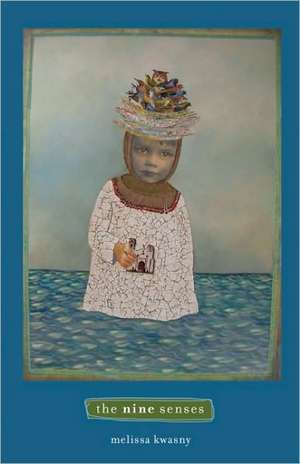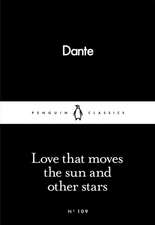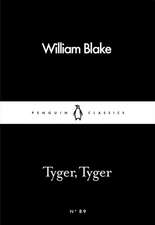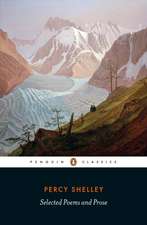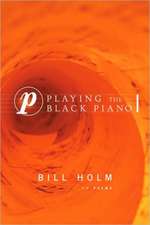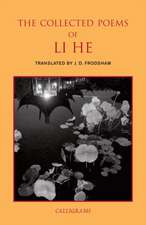The Nine Senses
Autor Melissa Kwasnyen Limba Engleză Paperback – 28 feb 2011
Preț: 83.12 lei
Nou
Puncte Express: 125
Preț estimativ în valută:
15.91€ • 16.59$ • 13.22£
15.91€ • 16.59$ • 13.22£
Carte disponibilă
Livrare economică 28 februarie-14 martie
Preluare comenzi: 021 569.72.76
Specificații
ISBN-13: 9781571314376
ISBN-10: 1571314377
Pagini: 91
Dimensiuni: 140 x 213 x 10 mm
Greutate: 0.16 kg
Editura: Milkweed Editions
ISBN-10: 1571314377
Pagini: 91
Dimensiuni: 140 x 213 x 10 mm
Greutate: 0.16 kg
Editura: Milkweed Editions
Recenzii
“Melissa Kwasny’s work serves as a brilliant tonic, reminding us of the essential gravitas of poems of distinction. Hers present a richly textured surface and a deeply thought interior, and have a compass that deftly mingles the scholarly page with beauticians’ hopes and tobacco pouches; a naturalist’s tight focus with the wide gaze of a woman of the world; a lyricist’s gifts with a philosopher’s understandings. This is the real-deal stuff.”—Albert Goldbarth, author of The Kitchen Sink, on Reading Novalis in Montana
“In The Nine Senses, Melissa Kwasny follows the path of amor mundi beyond the ‘senses five,’ never parting the real from the dreamt, the dead from the living, the lost from the loved, the solitary from the communal. In a book of prose poems, she makes her turns internally. As with my favorite words, rooms, faces, and flowers, I feel that light is sewn up into them. Between their lines moves an ethics of embodied becoming, like the tree, ‘whole and shining,’ she gives us in the spaces of venetian blinds. ‘The dawns are numbered, as I am,’ she writes. But in the joint counting houses of morphology and phenomenology, each hour could take a lifetime to know. Inside the devastation and the beauty, we sit with the question: will we seek salvation from the world, or a radicalized (re) attachment to it. ‘Nay, too late for cost-counting’ says the hell-bound speaker in Christina Rossetti¹s ‘Amor Mundi’ ‘This downhill path is easy, but there¹s no turning back.’ Today more than ever we must ask ourselves which is the real hell: amor mundi or contemptus mundi. Turn away no more, says Blake. Kwasny has written us a book of charms, in the old sense. A book to bind us to the world, and to each other.”--Sarah Gridley
“In The Nine Senses, Melissa Kwasny follows the path of amor mundi beyond the ‘senses five,’ never parting the real from the dreamt, the dead from the living, the lost from the loved, the solitary from the communal. In a book of prose poems, she makes her turns internally. As with my favorite words, rooms, faces, and flowers, I feel that light is sewn up into them. Between their lines moves an ethics of embodied becoming, like the tree, ‘whole and shining,’ she gives us in the spaces of venetian blinds. ‘The dawns are numbered, as I am,’ she writes. But in the joint counting houses of morphology and phenomenology, each hour could take a lifetime to know. Inside the devastation and the beauty, we sit with the question: will we seek salvation from the world, or a radicalized (re) attachment to it. ‘Nay, too late for cost-counting’ says the hell-bound speaker in Christina Rossetti¹s ‘Amor Mundi’ ‘This downhill path is easy, but there¹s no turning back.’ Today more than ever we must ask ourselves which is the real hell: amor mundi or contemptus mundi. Turn away no more, says Blake. Kwasny has written us a book of charms, in the old sense. A book to bind us to the world, and to each other.”--Sarah Gridley
"Melissa Kwasny's work serves as a brilliant tonic, reminding us of the essential gravitas of poems of distinction. Hers present a richly textured surface and a deeply thought interior, and have a compass that deftly mingles the scholarly page with beauticians' hopes and tobacco pouches; a naturalist's tight focus with the wide gaze of a woman of the world; a lyricist's gifts with a philosopher's understandings. This is the real-deal stuff."--Albert Goldbarth, author of "The Kitchen Sink", on "Reading Novalis in Montana""In "The Nine Senses", Melissa Kwasny follows the path of amor mundi beyond the 'senses five, ' never parting the real from the dreamt, the dead from the living, the lost from the loved, the solitary from the communal. In a book of prose poems, she makes her turns internally. As with my favorite words, rooms, faces, and flowers, I feel that light is sewn up into them. Between their lines moves an ethics of embodied becoming, like the tree, 'whole and shining, ' she gives us in the spaces of venetian blinds. 'The dawns are numbered, as I am, ' she writes. But in the joint counting houses of morphology and phenomenology, each hour could take a lifetime to know. Inside the devastation and the beauty, we sit with the question: will we seek salvation from the world, or a radicalized (re) attachment to it. 'Nay, too late for cost-counting' says the hell-bound speaker in Christina Rossettis 'Amor Mundi' 'This downhill path is easy, but theres no turning back.' Today more than ever we must ask ourselves which is the real hell: amor mundi or contemptus mundi. Turn away no more, says Blake. Kwasny has written us a book of charms, in the old sense. A book to bind us to the world, and to each other."--Sarah Gridley
Descriere
In this groundbreaking fourth collection comprised of exquisitely crafted prose poems, Melissa Kwasny examines the world around her with the quiet and profound attention of a poet at the height of her powers. The questions that have informed much of Kwasny’s previous work—how does one have a relationship with the natural world in our time? What can we learn about being human from non-human forms of life?—find a new urgency in The Nine Senses, as image collides with image to produce a singular ecological and poetic vision, one that is often dire and surreal. “Perhaps the extra four senses contribute to the surreal in the sense that Breton defined it—as resolution of the real and the dream,” Kwasny writes in the title poem. Thematically rich and varied, touching on mortality, temporality, and eternity, this collection puts Kwasny on the forefront of American poetry, and asks the reader: how do we tie ourselves to the world when our minds are always someplace other than where we are?
